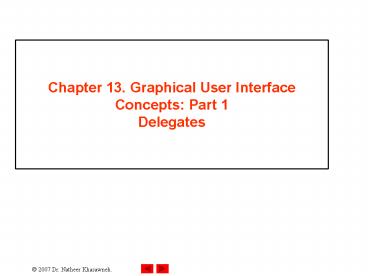Chapter 13' Graphical User Interface Concepts: Part 1 Delegates - PowerPoint PPT Presentation
1 / 14
Title:
Chapter 13' Graphical User Interface Concepts: Part 1 Delegates
Description:
methods is specified when the delegate class is defined. ... public static int DoSomeMath(MathOp fn, int x, int y) return fn(x, y); //Invoke the delegate ... – PowerPoint PPT presentation
Number of Views:29
Avg rating:3.0/5.0
Title: Chapter 13' Graphical User Interface Concepts: Part 1 Delegates
1
Chapter 13. Graphical User Interface Concepts
Part 1Delegates
2
Delegates
- Simplest description type-safe function pointers
- Declaring a delegate defines a class that derives
from System.MulticastDelegate, which derives from
System.Delegate
3
Delegates
- Sometimes useful to pass methods as arguments to
other methods - Delegates are sets of references to methods
- Delegate objects can be passed to methods
methods can then invoke the methods the delegate
objects refer to - Delegates that contain one method are known as
singlecast delegates and are created or derived
from class Delegate - Delegates that contain multiple methods are known
as multicast delegates and are created or derived
from class MulticastDelegate
4
Delegates
- Delegates must be declared before use
- A delegate declaration specifies the parameters
and return type of the methods the delegate can
refer to - Methods who can be referred to by a delegate,
must have the same signature as the delegate - Delegate instances can then be created to refer
to a method(s) - Once a delegate instance is created, the method
it refers to can be invoked
5
Delegates
- Delegates maintain a list of methods to be called
when the delegate is invoked. - To insure type safety, the signature (return type
and arguments) of acceptable callback - methods is specified when the delegate class is
defined. - We instantiate a delegate by "wrapping" the
callback method. - We can add methods to the callback chain or
remove methods from the chain.
6
Using Delegate
- First must declare one.
- The delegates declaration specifies a method
header (parameters and return value). - Methods whose references will be contained within
a delegate object must have the same method
header as that defined in the delegate
declaration. - Second create methods that have this signature.
- The third step is to create a delegate instance
that contains a reference to that method. - Finally we can invoke the method reference that
it contains. We show this process in our next
example.
7
- using System
- delegate int MathOp(int x, int y) //Declare
delegate type - class Class1
- static void Main(string args)
- MathOp f1 new MathOp(Class1.Add)
//Instantiate - MathOp f2 new MathOp(Class1.Mult)//delegates
- Console.WriteLine(DoSomeMath(f1, 2, 3))
- Console.WriteLine(DoSomeMath(f2, 2, 3))
- public static int DoSomeMath(MathOp fn, int x,
int y) - return fn(x, y) //Invoke the delegate
- public static int Add(int a, int b)
- return a b
8
(No Transcript)
9
- class DemoClass
- private string name
- private int number
- public DemoClass(string str, int x)
- name str
- number x
- public void ShowMyName()
- Console.WriteLine("My name is " this.name)
- public void ShowMyNumber()
- Console.WriteLine("My number is "
this.number)
10
- delegate void DemoOp() //Declare delegate type
- static void Main(string args)
- //Create some objects
- DemoClass dc1 new DemoClass("Demo 1", 1)
- DemoClass dc2 new DemoClass("Demo 2", 2)
- //Declare an empty delegate
- DemoOp demoDel null
- //Append a method to list
- demoDel new DemoOp(dc1.ShowMyNumber)
- //Append another one
- demoDel new DemoOp(dc2.ShowMyName)
- //Invoke the delegate
- demoDel()
11
(No Transcript)
12
- class DemoClass
- private string name
- private int number
- public DemoClass(string str, int x)
- name str
- number x
- public void ShowMyName()
- Console.WriteLine("My name is " this.name)
- public void ShowMyNumber()
- Console.WriteLine("My number is "
this.number)
What is "this" when the method is called via
a delegate?
13
- delegate void DemoOp() //Declare delegate type
- static void Main(string args)
- //Create some objects
- DemoClass dc1 new DemoClass("Demo 1", 1)
- DemoClass dc2 new DemoClass("Demo 2", 2)
- //Declare an empty delegate
- DemoOp demoDel null
- //Append a method to list
- demoDel new DemoOp(dc1.ShowMyNumber)
- //Append another one
- demoDel new DemoOp(dc2.ShowMyName)
- //Invoke the delegate
- demoDel()
14
Delegates Behind the Scenes































